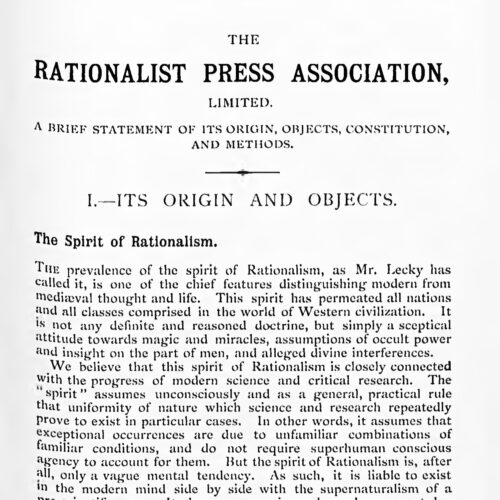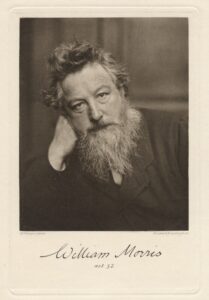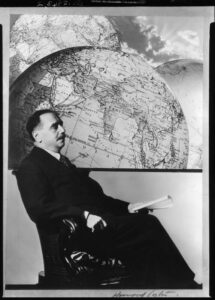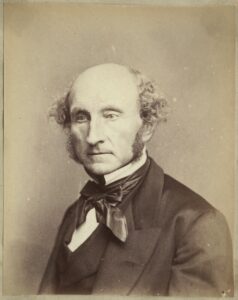

From the Agnostic Annual, 1900, edited by Charles A. Watts (founder of the Rationalist Press Association).
The Spirit of Rationalism.
The prevalence of the spirit of Rationalism, as Mr. Lecky has called it, is one of the chief features distinguishing modern from mediaeval thought and life. This spirit has permeated all nations and all classes comprised in the world of Western civilization. It is not any definite and reasoned doctrine, but simply a sceptical attitude towards magic and miracles, assumptions of occult power and insight on the part of men, and alleged divine interferences.
The prevalence of the spirit of Rationalism, as Mr. Lecky has called it, is one of the chief features distinguishing modern from mediaeval thought and life. It is not any definite and reasoned doctrine, but simply a sceptical attitude towards magic and miracles, assumptions of occult power and insight on the part of men, and alleged divine interferences.
We believe that this spirit of Rationalism is closely connected with the progress of modern science and critical research. The “spirit” assumes unconsciously and as a general, practical rule that uniformity of nature which science and research repeatedly prove to exist in particular cases. In other words, it assumes that exceptional occurrences are due to unfamiliar combinations of familiar conditions, and do not require superhuman conscious agency to account for them. But the spirit of Rationalism is, after all, only a vague mental tendency. As such, it is liable to exist in the modern mind side by side with the supernaturalism of a Pre-scientific age. It does so conspicuously under present-day Protestantism. Most Protestants are Rationalists in their attitude towards contemporary instances of alleged miracle and inspiration. They are Rationalists in their attitude towards the sacred literatures of Buddhists, Brahmans, Parsees, and Mohammedans, and towards the distinctive teachings of the Church of Rome. As regards the Narrative and theology contained in the Bible, however, they are not Rationalists, but at best compromisers between traditional reverence and scientific inquiry. Thus, while the spirit of Rationalism is rife, the attempt to raise Rationalism into a consistent rule of the intellectual life is extremely unpopular. The Rationalist Press Association, Limited, hopes, nevertheless, to promote this great end, in the face both of active opposition and of widespread indifference.
Embodiment of the Rationalistic Spirit.
The physical sciences are, within their respective limits, the most consistent embodiments of the spirit of Rationalism. Astronomy, geology, and biology have successively broken away from Biblical tradition. They have become genuine sciences through an exercise of the freest and most serious inquiry, combined with the expectation of discovering natural uniformities where men formerly saw nothing but supernatural mysteries. But the special sciences belong primarily to specialists. What the average thinking man requires is a good synopsis of the object-matter and results of science, an insight into its nature and methods, and a habit of mind which will enable him to form sensible and serviceable judgments as to the many questions which cannot yet (and perhaps never can) be decided with scientific accuracy.
To temper Freethought with philosophy, and to assist in freeing philosophy from all academic trammels and fanciful excrescences, are among the objects for which the The Rationalist Press Association, Limited, has been formed.
Thus the spirit of Rationalism has needed to embody itself, not only in science and exact research, but in certain types of human thought which form, as it were, the atmosphere of science. Among the more highly cultivated intellects it has given rise to the various schools of modern philosophy. Among the people and certain of their democratic leaders it has given rise to the various parties of modern Freethought. Philosophy is, on the whole, somewhat conservative, although it is far more anxious to conserve the wide outlook of Plato and Aristotle than the theology of Paul and Augustine. The tendency of popular Freethought is more revolutionary and impatient for a new start in human ideas. With the spread of education and democracy, however, these two types of advanced thought must increasingly coalesce. In coalescing, Freethought should gain breadth of view and lose the “scoffing” habit which only hardens foes and alienates many who would otherwise be friends. Philosophy, on the other hand, should gain a certain downrightness and relation to practical life which it generally lacks, and at the same time learn to relinquish such speculations as the fuller criticism of human knowledge may prove to be indeed futile. To temper Freethought with philosophy, and to assist in freeing philosophy from all academic trammels and fanciful excrescences, are among the objects for which the The Rationalist Press Association, Limited, has been formed.
A Definition of Rationalism.
The definition of Rationalism originally proposed by the promoters of the Association was submitted to several of the best-known philosophic and critical thinkers of the day, and has undergone some modification in accordance with their advice. It now stands in the Memorandum of Association (3d) as follows:—
“Rationalism may be defined as the mental attitude which unreservedly accepts the supremacy of reason and aims at establishing a system of philosophy and ethics verifiable by experience and independent of all arbitrary assumptions or authority.”
We are of course, aware that a system of philosophy would include some system of ethics. In making direct mention of ethics we wish to accentuate the fact that the philosophy of Rationalism cannot fail to have important bearings on human conduct. We believe that these bearings will be far more beneficent in the long run than those of traditional theology, with its notions of divine commandments disobeyed by man, of heaven and hell, miraculous redemption, and so forth.
In making direct mention of ethics we wish to accentuate the fact that the philosophy of Rationalism cannot fail to have important bearings on human conduct. We believe that these bearings will be far more beneficent in the long run than those of traditional theology, with its notions of divine commandments disobeyed by man, of heaven and hell, miraculous redemption, and so forth.
The Limits of Compromise.
The semi-philosophic works which have acquired wide popularity in recent years are those which have set forth some new compromise (or what has really amounted to a compromise) between certain tenets of Christianity and certain views of modern science. We believe that this spirit of compromise, though a long way in advance of the spirit of sheer intolerance, lags equally far behind the philosophic spirit of truth-seeking.
Compromise is inevitable, and, to a certain extent, salutary, in Politics. This is because political measures have to be adjusted to the existing views of the most influential body of citizens, no matter whether those views be sound or the reverse. But the very fact which makes compromise legitimate in politics makes it illegitimate as regards religious and abstract social questions. Thus a consistent Rationalism is the direct antithesis, the uncompromising rejection, of that religious faith which deems it necessary to accept traditional and reputedly sacred opinions, without seriously inquiring into their evidential value. In saying this we do not, of course, mean that all traditional religious opinions are necessarily to be rejected, nor do we pretend to be in a position to teach the whole philosophy of Rationalism. That is still in the making, and it is that which the Rationalist Press Association, Limited, must help indirectly to make. Our contention is that the appeal to experience and reason must alone decide what elements of traditional Christianity are worthy to be retained, and that theological dogmas and scriptural prejudices must be allowed no more influence over the philosophic thinker than has the legend of creation contained in the book of Genesis over the present-day astronomer or geologist.
Thus a consistent Rationalism is the direct antithesis, the uncompromising rejection, of that religious faith which deems it necessary to accept traditional and reputedly sacred opinions, without seriously inquiring into their evidential value.
The Need of Propaganda.
Although the spirit of Rationalism has permeated the Protestant clergy, conforming and non-conformist alike, and, in many cases, the preachers are more liberal-minded than their flocks, professional needs naturally make them, as a body, hostile to Rationalism in any consistent shape. They and their lay supporters spare neither pains nor money in promulgating views which, though differing widely according to the church or sect from which they proceed, agree in attributing unique authority and surpassing excellence to the Christian religion, and defending, rather than dispassionately inquiring into, its supposed essentials. Many powerful associations, among which the Religious Tract Society and the Society for Promoting Christian Knowledge are perhaps the most widely known, are carried on largely with the object of vindicating Christian tradition against Rationalistic criticism.
Many powerful associations are carried on largely with the object of vindicating Christian tradition against Rationalistic criticism. Philosophic Rationalists, on the other hand, have been disposed to trust to the progress of science and the ultimate triumph of truth, and have made comparatively little effort to propagate their opinions.
Philosophic Rationalists, on the other hand, have been disposed to trust to the progress of science and the ultimate triumph of truth, and have made comparatively little effort to propagate their opinions. It is hoped that the Rationalist Press Association, Limited, will be a means of arousing and directing the energies of such torpid sympathisers. Concerted action among Rationalists was never more needed than now, in face of the present wide-spread reaction towards relatively irrational beliefs and practices. This reaction shows itself in the disposition to assert the sufficiency of instinct and sentiment, as well as to magnify the claims of custom and authority, while making light of reason, evading the duty of critical inquiry, and ignoring the need of a broad human and scientific outlook, such as constructive philosophic thought alone can give.
A Precursor of the R. P. A., Limited.
In 1890 was formed the Propagandist Press Committee. Its original object was to advise and assist Mr. Charles A. Watts in employing to the best advantage sums of money which Rationalist friends frequently entrusted to him for propagandist purposes.
In 1890 was formed the Propagandist Press Committee. Its original object was to advise and assist Mr. Charles A. Watts in employing to the best advantage sums of money which Rationalist friends frequently entrusted to him for propagandist purposes.
The Committee opened its career under the presidency of that esteemed warrior of Freethought and Secular progress, Mr. George Jacob Holyoake. The first meeting was held on Wednesday, July 2nd, and was attended by Dr. R. Bithell, Mr. Frederick Millar, Mr. F. J. Gould, and Mr. Charles A. Watts (Hon. Sec.). The object of the new movement was then defined as follows : “To assist in the production and circulation of liberal publications.” Among the original subscribers were Mr. Samuel Laing, Mr. Thomas Allsop, General Forlong, Mr. Daniel Baker, Dr. Clair J. Grece, and Mr. Sydney A. Gimson. In 1893 the title of the organization was changed to the Rationalist Press Committee, and the object was made to read: “To assist in the production and circulation of Rationalist publications.” During the nine years of its existence the Committee has carried on a useful though unobtrusive work. Its slender income from subscriptions of a little over £100 per annum has, we venture to affirm, been made the most of by the Committee itself, assisted by the sympathetic co-operation of its publishers, Messrs. Watts and Co.
Although subscribers and friends have been invited to discuss the affairs of the Committee, as at the meetings held in 1896 and 1897, no adverse criticism of the management has been offered. Its leaflets, pamphlets, and books have been issued at the lowest possible prices, and the primary object of propaganda has never been lost sight of. In addition to sales on the ordinary business terms, a large gratuitous distribution has been carried on for a number of years. Books have been presented to hundreds of Free Public Libraries; parcels of literature have been given, carriage free, to persons who could be relied upon to spread them judiciously among friends, inquirers, and societies; many thousands of leaflets have been distributed from house to house in London, Birmingham, Watford, etc.; quantities of selected pamphlets have been dispatched through the post to medical men, clergymen, and others; and some 50,000 leaflets on Secular Moral Instruction have been disseminated gratis.
A concise review of the Committee’s publications, the present stock of which has been handed over gratis to the new Association, will be found at the end of this pamphlet.
Obviously the Rationalist Press Committee has consisted only of a small group among those who may fairly be termed Rationalists, and its constitution has been purely private and informal. Its leading members decided, towards the end of 1898, that the time had come to make a serious effort to enlarge its scope.
The Origin of the R. P. A., Limited.
Obviously the Rationalist Press Committee has consisted only of a small group among those who may fairly be termed Rationalists, and its constitution has been purely private and informal. Its leading members decided, towards the end of 1898, that the time had come to make a serious effort to enlarge its scope. To it should succeed an Association having a formal constitution and legal status. The co-operation of Rationalists of all shades of opinion should be invited, and, to this end, the original promoters would place themselves unreservedly in the hands of the members, who should elect the Board. Publications more representative of the whole Movement should be issued. The services of new writers, and, if possible, writers of wide repute, should be secured. Competent readers should he employed to give opinions on MSS. submitted to the Association. Moneys received, through members’ subscriptions, donations, and bequests, should be expended to the best possible advantage in promoting Rationalism. Profits resulting from the sale of the Association’s publications should be devoted to the same end. With these objects in view the Rationalist Press Association, Limited, came to be formed.
Proposed Publications of the R. P. A., Limited.
Works of a serious, and especially those of a seriously philosophic character, are heavily handicapped in the competition for popular favour. Still more is this the case when such works soberly advocate unpopular views. The notion that the most successful books are the best may be partially true as regards works of imagination. It is very far indeed from being true as regards works of research and reflection. In these cases the author has usually to publish the book at his own expense, and, even should it acquire a steady sale, it is long before the outlay is recouped. If he cannot make the outlay, the probability is that his book, even though valuable in itself, will never see the light. It is therefore hoped that the Rationalist Press Association, Limited, may afford practical encouragement to authors, and especially young authors, who are capable of serious research or of hard thinking, and be a means of bringing their writings into circulation.
Works of a serious, and especially those of a seriously philosophic character, are heavily handicapped in the competition for popular favour… It is therefore hoped that the Rationalist Press Association, Limited, may afford practical encouragement to authors, and especially young authors, who are capable of serious research or of hard thinking.
The Association will especially look to taking up works on the following subjects :—
(1) Historical: mainly concerned with the history of religion, in its early connection and later contrast with secular enlightenment, as exhibited in science, art, and moral sentiment. Under this head would fall anthropological works, treating of primitive and savage rites and beliefs, works concerned with the great religions of the world and their inter-relationships, works on Biblical Criticism and ecclesiastical history, works contrasting the mediaeval regime of supernaturalism with the growing modern regime of Rationalism; and biographies of great Rationalists.
(2) Works of philosophy or the philosophical sciences. Under philosophical works might be included (a) those which deal especially with the nature and validity of human knowledge; (b) those which epitomize the object-matters and discoveries of the various sciences in a popular form, and tend to exhibit science as a connected whole; (c) those which discuss the nature of the cosmos and the human mind, in relation to the hypotheses of God and immortality. Under the philosophical sciences might be included works of logic, psychology, and ethics. In the last case the ethics of Rationalism would be vindicated against the baseless assumption that ethics can only flourish under the wing of theology.
(3) Educational works tending, in the words of the Memorandum of Association, “to promote a secular system of education, the main object of which shall be to cultivate in the young moral and intellectual fitness for social life.”
(4) Pamphlets or leaflets in reference to any of the above subjects.
Provision has been made in the Memorandum for the producing, purchasing, or subsidising of periodical publications calculated to advance the Association’s general principles.
Works of fiction or poetry which should indirectly embody Rationalist principles, and prove that those principles are perfectly compatible with the full play of imagination, might be numbered among the Association’s publications.
It would, of course, rest with the Board, as representing the Association, to extend or modify the above general programme. For instance, works of fiction or poetry which should indirectly embody Rationalist principles, and prove that those principles are perfectly compatible with the full play of imagination, might be numbered among the Association’s publications. So might works dealing with social problems and political questions; but these we should wish to approach with especial caution.
Rationalism in Relation to Social Problems.
We are not unmindful of the fact that the progress of Rationalism must ultimately involve important changes in political institutions and social customs as well as in philosophic theory and ethical sentiment. (Among minor changes in custom, the progressive relaxation of Sabbatarianism is one of which we suppose all Rationalists approve, provided that those who may be called upon to work for the general public on its day of rest and recreation have some equivalent holiday secured to them.) The Irrationalism against which we fight appears not only in cults and creeds, but in anomalies of constitution and law, in social prejudices and abuses, in wasteful and oppressive economic conditions, and in much conventional prudery of ecclesiastical or Puritanical origin. But, while recognizing the need of practical reforms in these and other directions, the Association will not bind itself to the advocacy of any particular social and political views. Individual Rationalists must, of course, have their own opinions as to such questions, which are of vast importance in themselves. On the other hand, the great principle of Rationalism must not be compromised by identification with special social views, which are liable to be extreme and one-sided, and have in all cases a provisional character. The main objects of Rationalism are philosophical and ethical: first, to promote a synopsis of history and science, which will familiarize the individual with the knowable universe of which he is a member; second, to place human duty on the rational basis afforded by this knowledge, in conjunction with those ethical instincts which can be shown to make for the well-being of human society.
The main objects of Rationalism are philosophical and ethical: first, to promote a synopsis of history and science, which will familiarize the individual with the knowable universe of which he is a member; second, to place human duty on the rational basis afforded by this knowledge, in conjunction with those ethical instincts which can be shown to make for the well-being of human society.
Should the reader have any interest in the objects of the Association as here set forth, but should he, at the same time, be fearful that the practical work of the Association will not be on a level with its professed principles, we would say to him: Join the Association , and give us the benefit of your criticism. To all sympathizers we say: Do not wait to see how the Association succeeds, but join it and help to make it a success.
Conditions of Membership.
The Rationalist Press Association, Limited, is “a Company Limited by Guarantee, and not having a Capital divided into shares.” It is a propagandist, not a commercial, undertaking. Each member agrees to be liable for a sum not exceeding one pound, in the case of the Association’s being wound up; but even should the necessity for winding up occur (a highly improbable contingency), it is not likely that the members would be called upon for the amount of their guarantee, as the Directors will doubtless refrain from embarking on any undertaking for which ample pecuniary provision has not been made.
Any person above the age of twenty-one may, with the consent of the Board, become a member, on payment of an annual subscription of not less than five shillings.
Any person above the age of twenty-one may, with the consent of the Board, become a member, on payment of an annual subscription of not less than five shillings. The subscription is payable in advance in the month of January of each year. A member may, on his own application, retire from the Association upon giving one month’s previous notice in writing to the Secretary. Every member may vote, in person or by proxy, at any General Meeting of the Association. A member will receive a copy of each new publication of the Association, provided the total value of the publications forwarded during the year does not exceed the amount of his or her subscription.
The minimum subscription has been fixed at five shillings, in order not to exclude any sympathisers from membership. It is, of course, hoped that those who are able to subscribe more liberally will do so. It is also thought to be fair that those who may lend very substantial support to the Association should have an extra voice in controlling its affairs. It has therefore been decided that a subscriber of five pounds shall be entitled to two votes, and to a further vote for each additional five pounds he may subscribe.
Annual Meetings of the Association will be held in the month of February in each year. At the first General Meeting of the Association, to be held within four months of the registration of the Association, the Board will be chosen by the members from among themselves. Those who care to become exactly acquainted with the constitution and powers of the Board, and its relation to the members at large, may consult the Articles of Association.
A form of application for membership can be obtained from the Secretary; but application may also be made by ordinary letter, the applicant taking care to state that he or she agrees to abide by the rules and regulations as set forth in the Memorandum and Articles of Association.
Honorary Associateship.
It is proposed that the Directors shall, from time to time, elect, as “Honorary Associates,” students, thinkers, and others who have gained distinction for their services to the cause of rational advancement, and who may be willing to give the Association the benefit of their names, and possibly also of their advice. Honorary Associates would be invited to be present and to speak at meetings of the Board as well as at General Meetings of the Association. They would not, of course, vote at General Meetings unless they had become subscribing members; nor would they vote at Board Meetings, though they might subsequently become Directors.
It is proposed that the Directors shall, from time to time, elect, as “Honorary Associates,” students, thinkers, and others who have gained distinction for their services to the cause of rational advancement, and who may be willing to give the Association the benefit of their names.
Relation of the Association to its Servants and to Authors.
No regulations have at present been framed as to the payment of authors or employés of the Association. It is proposed, however, that authors whose works are approved shall be paid a fair sum down for their services, and, in addition, a royalty on copies sold. The question of Directors’ fees has been left open, but it is anticipated that suitable Directors will be found who will be willing to serve the Association gratuitously, or for a nominal fee to cover travelling expenses. The Secretary pro tem. is able and willing to give his services for a nominal salary, until the response to our present appeal and the amount of secretarial work entailed can be ascertained.
Donations.
It is hoped that all who are in fact Rationalists will give their open support to the Association. It has long ceased to be dangerous, and there is no reason why it should be inconvenient or infra dig., to acknowledge such principles as those which the Association professes.
It is hoped that all who are in fact Rationalists will give their open support to the Association. It has long ceased to be dangerous, and there is no reason why it should be inconvenient or infra dig., to acknowledge such principles as those which the Association professes. At the same time there may be, as there have been in the past, friends who prefer for special reasons to conceal their sympathy with Rationalism. Such friends can help, without becoming members of the Association, by informal subscriptions and donations, in the full assurance that their confidence will not be abused by the Board. We also invite special donations, no matter how small, from members who can spare such sums in the present, but do not care to include them in the amount of their annual subscription.
Bequests.
One of the most important reasons for the existence of the Rationalist Press Association, Limited, is the need of a legally constituted body for carrying out the wishes or instructions of those who from time to time may wish to leave large or small sums of money to be devoted to purposes of philosophic inquiry or educational enlightenment. In the ordinary course such sums fall into the hands of trustees, who, no matter how conscientious, are largely swayed by current religious prejudice, and possess very little sympathy with the testator’s motives. If, however, the money were placed in the hands of such a body as it is believed the Rationalist Press Association, Limited, will become, there would be the fullest guarantee, not only for the conscientious, but for the intelligent and sympathetic, carrying out of the testator’s intentions.
One of the most important reasons for the existence of the Rationalist Press Association, Limited, is the need of a legally constituted body for carrying out the wishes or instructions of those who from time to time may wish to leave large or small sums of money to be devoted to purposes of philosophic inquiry or educational enlightenment.
It is hoped that Rationalists and sympathisers with Rationalism will, in making their wills, bear in mind the claims of the Association. The following is suggested as a form of bequest:—
“I give to the Rationalist Press Association, Limited, whose registered office is situated at 17, Johnson’s Court, Fleet Street, London, E. C., the sum of [the amount should be written in full] free from Legacy Duty, to apply the same for the general purposes of the said Association; and the receipt of the Secretary for the time being shall be a sufficient discharge to my executors for such legacy.”
Special purposes, in accordance with the Association’s general principles, might, of course, be specified at the testator’s discretion.
On making a bequest to the Association, it is advisable that an intimation of the same should be forwarded to the Secretary, though, of course, this is not absolutely necessary. The purport of such communications would be regarded as strictly confidential by the Board of Directors.
Functions of the Association not Purely Literary.
While the propagation of Rationalist principles through published literature of one sort or another will be the chief function of the Association, it can, by its constitution, act in other ways. Provision has been made in the Memorandum for petitioning Parliament in relation to measures affecting education and freedom of thought; while the Association can act, by delegate or otherwise, in conjunction with any council, committee, or other body of persons, formed with more or less similar objects. Although the purposes of the Association are not primarily social, in the ordinary sense, it is probable that it may be a means of promoting intercourse and creating a better understanding between societies and individuals who are practically agreed on the necessity of Rationalism, though differing as to the precise form which it ought to assume.
While the propagation of Rationalist principles through published literature of one sort or another will be the chief function of the Association, it can, by its constitution, act in other ways.
A copy of the Memorandum and Articles of Association can be obtained upon application to the Secretary, Charles E. Hooper, 17, Johnson’s Court, Fleet Street, London, E. C.

Fellowship is heaven, and lack of fellowship is hell. William Morris, A Dream of John Ball (1888) Painter, textile designer, artist, […]

The Progressive League was an organisation dedicated to the advancement of scientific humanism, founded by author H.G. Wells and philosopher […]

Everywhere man blames nature and fate yet his fate is mostly but the echo of his character and passion, his […]

I will call no being good, who is not what I mean when I apply that epithet to my fellow-creatures; […]